What Is a Current Converter?

A current converter is a converter device that converts the supply current to a desired current and outputs it according to the application.
Commonly used current converters are used to convert current in factory automation applications, in-vehicle applications, and so on.
Uses of Current Converters
Current converters are used for the purpose of current conversion between electronic devices in xEVs in factory automation (FA).
Current converters can be broadly classified into four types in the current situation, and it is necessary to select the type of current converter that best suits the purpose of use and the operating environment.
The categories of current converters are listed below:
- DC-DC: DC-DC conversion
- AC-DC: AC-DC conversion
- DC-AC: DC-AC conversion
- AC-AC: AC-AC conversion
Principle of Current Converters
A current converter is an assembly of parts that transmit current and elements or devices that convert the current according to the application.
Current converters play the role of converting the current between various devices so that the current that powers them can be used in an optimal manner, and are incorporated in a wide variety of machinery and equipment, including automobiles and machine tools.
As an example, the following is an example of current conversion between an on-board lithium-ion battery and an on-board drive motor in a hybrid vehicle.
- A drive command is received from the on-board ECU to the on-board drive motor.
- The on-board lithium-ion battery is instructed to supply power from the on-board drive motor to the on-board lithium-ion battery.
- After checking the status of the lithium-ion battery, the battery outputs 200 V and supplies power to the on-board drive motor.
- After receiving DC-AC current in front of the onboard drive motor, the current is converted to drive the motor.
The current converter is used for all voltage conversions in the above flow.